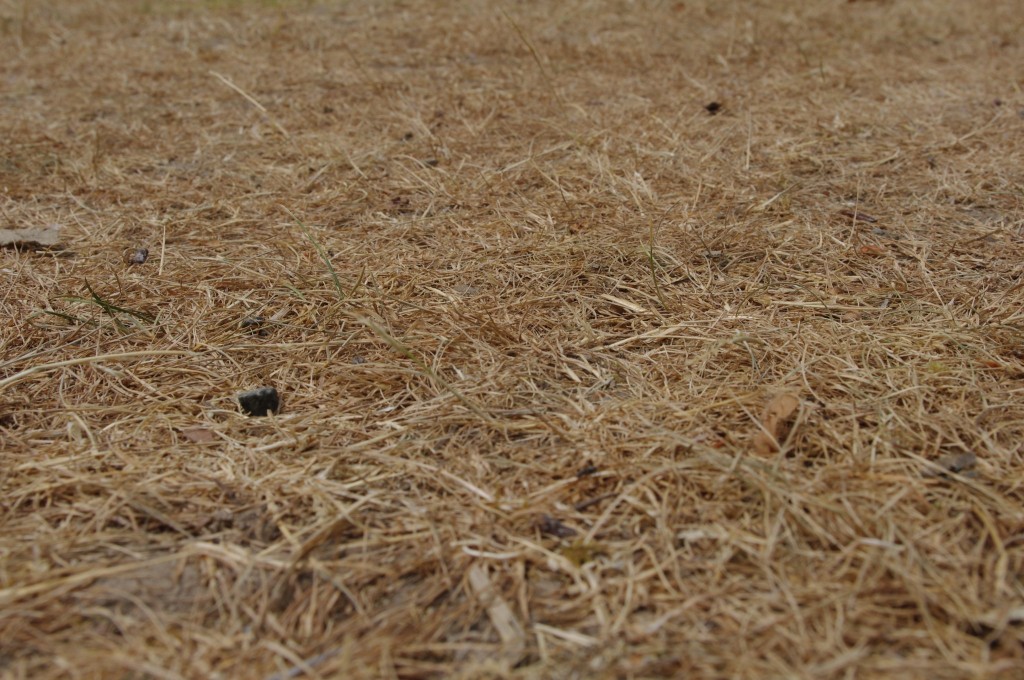We have been noticing this trend towards drought where we live. We sparingly use water, letting it “mellow if it’s yellow” and hand watering our veggie garden so just the “important” plants get the nourishment they need.
But, our city kids have had a harder time adjusting to a water shortage. They beg for water fights, and the chance to run through a sprinkler. They are getting better with turning off the tap while they brush their teeth, and hubby has set a timer in the bathroom so that short showers actually have a defined limit.
It is a harder learning curve for the older girls, but our son is more keenly tapped into what is happening here. But now our little island is in a Stage 4 drought, and, unfortunately, there is no “stage 5” or above.
Over the weekend, as we were hiding out in the shade, my son came over to me and said “Mom, I think the clouds have just given up trying to make rain. They just can’t do it anymore”
Yes, son. I think you are right. The rain clouds we were so used to in my youth just aren’t there any more. The heavy rainfall the lower mainland used to get has reduced with even less of it hitting out little island. With only about 5mm of rain falling since April, things are getting dire here, AND in the cities.
So, this one is for you, my city living friends. Take some tips from a gal who used to be able to turn on the tap with no thought or concern for the consequences, because even though the water still comes out of the tap at your house, doesn’t mean that there is enough of it to go around. Read the tips on how to save water around the home, and try to implement a few of them as a starting point.
Making a few changes NOW can help train your kids about water conservation, because I have a strange feeling that they are going to need it even more than we do.
1. Green Lawns are For Jerks.
Do you know how much energy it takes to grow a lawn? A lush green lawn not only needs a massive amount of water, in fact one hour of lawn sprinkling uses as much water as 25 toilet flushes, five loads of laundry, and five dishwasher loads, but also a bundle of “bad for the world” chemicals and fertilizers. EVEN if you apply only “natural” products to your lawn, these still run down to our water supply.
Lawns provide very little environmental benefit, and the “benefits” they do add, can also be provided by native plants that will product food for wildlife, even better soil erosion control and environmental stabilization.
For all of you who want to follow the next trend, I suggest you tear out that lawn and create either a kitchen style garden, or a native plant environment. Something that will give back to you AND the environment.
2. There is a better way to sprinkle
I am married to a guy who has been working in the irrigation industry for 15 years. Part of our decision to move rural was because he couldn’t handle installing massive sprayer systems for city lawns. Now an in ground irrigation system WILL greatly reduce your water use and allow you to water at low peak times, but I recommend you ditch the sprayers and move towards drip irrigation.
A drip irrigation system will work to water ONLY the plants that need it. A thin hose with strategically placed “holes” can be wound through your food and flower gardens to feed the plants the water they need, without the waste to the sidewalks, and gaps in the garden.
If you mulch on top of your drip lines, you will retain even more of the moisture as is soaks down. This is also a better way to water your plants, from the root, not spraying the leaves.
3. Capture the Water
Big garden or small, we can help the summer droughts by capture our rain water, and grey water for use around the home. Building permeable patios and walkways to allow the run off to soak back into the soil vs draining to the streets and gutters will help out the water table, but installing rain tanks and capturing your roof run off will also help.
Grey water, systems can be connected to your kitchen sink, dishwasher and washing machine. These systems should be then plumbed into deep rooted trees or gardens. Using bio degradable, plant sae detergents and soaps will keep these plants healthy, and reduce the constant stream of “pretty clean water” into our sewers.
Now, don’t use grey water for your veggie crops, or shallow rooted fruits (berries etc). These plants are better watered with rain catchment systems.
Catchment ponds can also help bring the water back to dry areas, as well as nourish the wildlife and insects on your property. If you have an area with a lot of run off, using piping to redirect it to a pond. Be sure to plant the area based on high and low water levels, and make it deep enough that the catchment lasts throughout the summer.
4. Schedule Your Water Use
These days washing machines and dishwashers all come with a “delay” option. This can be your best friend during the dry months (or even the wet) Schedule your water use for the midnight hours when the system is not being taxed by the other million people in your community. It is a small, but helpful step and can help ease the stress on your water source.
5. Watch the Taps
Hopefully we have all stopped letting the tap run while we brush our teeth or wash our face. Simply turning OFF the tap can make a big change in your water waste.
But, how many of us still let the water “run” while it cools off so we can grab a drink?
Get your kids used to filling a water jug (or two) and putting them in the fridge to cool off. Or purchase a water system that has large, cooled water already, so you don’t get 4 cupfuls of water run off for every glass you drink.
6. Let it Mellow
The big line is “If it’s yellow, let it mellow. If its brown, flush it down” Teach it to your kids, and adjust to a yellowed tank for the summertime months. Or, better yet, tell them to pee in the shower (if they are having one already!) Think of every flush before you make it, because at the end of the day, in a busy household, every flush counts.
Of course, by now you should have installed low flow toilets, taps and shower nozzles. I know a “heavy shower” is awesome, but it isn’t necessary and it is a small sacrifice for a big long term change!
I mean, if Brazil makes commercials urging people to do it. . .
7. Be Cool, Conserve.
Get over yourself. Conversation is cool, and the sooner you jump on the band wagon the better we will ALL be. Stop washing your car, stop water your lawn. Take shorter showers, and think about every drop you drain.
I mean, that is the crux of it, isn’t it? THINK!
We were raised with a constant stream of water, in a country that complains about the rain more than we cherish it. We need to change our attitudes, and our habits and start adapting NOW.
8. Find Water, don’t Waste Water
Yes, my kids are just like yours and want to jump through the sprinkler, swim in the kiddy pool and have water fights all summer long.
But we don’t. And they know why.
Instead, we go FIND water. We take them to the ocean, or the lake. We find a natural spring or river to dip our toes into, and we do NOT let the sprinkler lazily flip and flop, during the heat of the day, so the kids can jump over it a few times.
We live in a country with amazing water environments, so if you feel the urge to cool off, use one of THEM. Bring Mohammed to the mountain, not the mountain to Mohammed, as the old saying goes.
9. Pull the Weeds
If you have areas you are watering make sure that you are only watering what you need. Pull the weeds, trim the suckers off your trees and, in times of extreme drought, prune your trees and shrubs back so that you can feed enough of the plant to maintain its life, without needing to add extra to allow it to grow.
This is especially true if you are starting to see your shrubs and trees brown. For the sake of the plant, give it an aggressive prune. This will reduce the water it needs, and the distance it has to send that water to feed the plant.
Like cutting off an extremity to save a life.
I am spending another day in the shade, and now the smoke of the local wildfires. Another day where I notice the ground is dryer and more cracked than it was before. Another day where I see the tall fir trees browning, and the shrubs and trees curling their leaves to conserve water.
Drought is all around me, there is no chance NOT to notice it. I daily choose to water my livestock and my family, spare a few drops for our food crop, and let the grass die, and the laundry be ” clean enough” for another day.
What are you choosing today?

